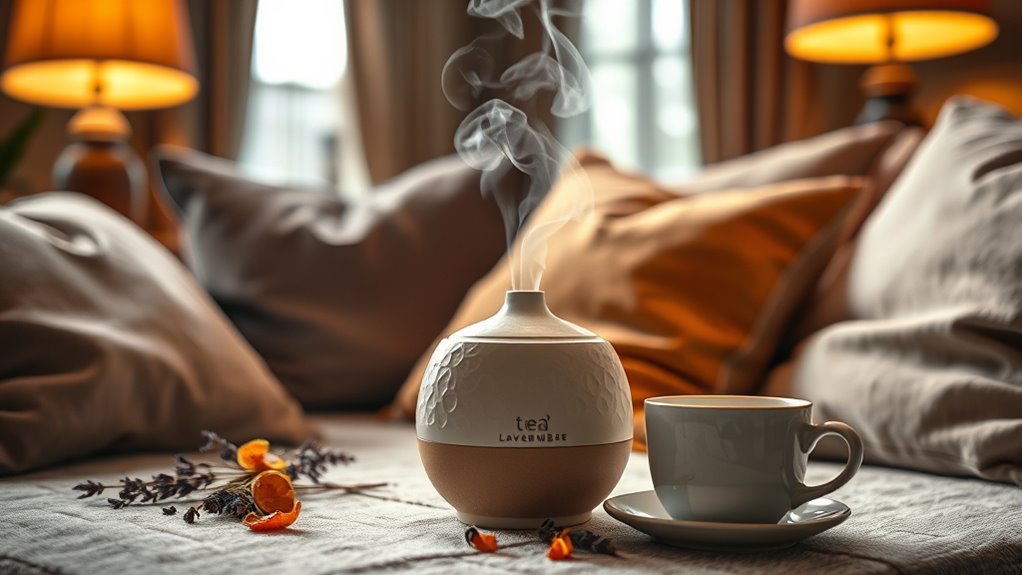Your sense of smell directly influences your comfort by triggering emotional and physiological responses. Pleasant scents like lavender, vanilla, or citrus can calm you down, boost your mood, and make your environment feel more inviting. Different scents may resonate personally or culturally, shaping how relaxed or stressed you feel. By understanding how scent impacts emotions, you can create a soothing atmosphere tailored to your preferences—discover more ways to enhance your comfort along the way.
Key Takeaways
- Pleasant scents activate the brain’s emotional centers, boosting mood and creating a sense of comfort and safety.
- Specific fragrances like lavender and chamomile promote relaxation and reduce stress levels.
- Scent-memory associations can quickly influence feelings, evoking nostalgia or calmness.
- Overpowering or unpleasant odors can increase discomfort and anxiety.
- Customizing scent environments to personal preferences enhances overall well-being and sensory satisfaction.
The Science Behind Smell and Emotional Response

Since smell has a direct link to the brain’s emotional centers, it can evoke powerful feelings instantly, often without us realizing why. When you breathe in a scent, it binds to your olfactory receptors located in your nasal cavity. These receptors send signals directly to the brain’s limbic system, which is responsible for emotional processing and memory. Because of this direct pathway, certain smells can trigger strong emotional reactions—happiness, nostalgia, or even anxiety—without conscious thought. Your brain quickly interprets these signals, linking scents to past experiences and feelings. This biological connection explains why a familiar smell can instantly uplift your mood or evoke a sense of comfort, revealing the profound influence of scent on your emotional state. Additionally, understanding the power of scent can help you intentionally create environments that promote well-being and emotional stability.
Common Scents That Promote Relaxation
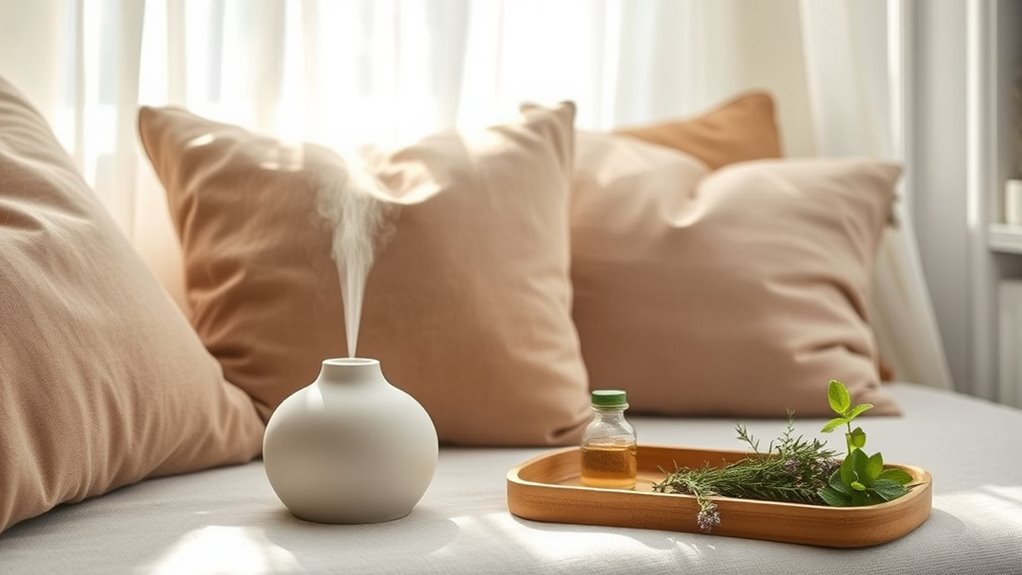
Certain scents have the power to instantly calm your mind and body, making them popular choices for relaxation. Herbal infusions like lavender, chamomile, and eucalyptus are known for their soothing effects. You can enhance their calming properties through scent layering—combining different herbal fragrances to deepen relaxation. For example, blending lavender with a hint of peppermint creates an invigorating, tranquil atmosphere. Using herbal infusions in candles, diffusers, or sprays helps create a peaceful environment. Scent layering allows you to customize your space, making relaxation more effective. Keep in mind, the key is to choose scents that resonate with you personally; what relaxes one person may differ for another. Incorporating these common, calming scents into your routine can markedly improve your overall comfort. Additionally, understanding the financial impact of entertainment can help you appreciate how influential these sensory experiences can be in shaping your environment and mood.
How Fragrances Influence Mood and Behavior
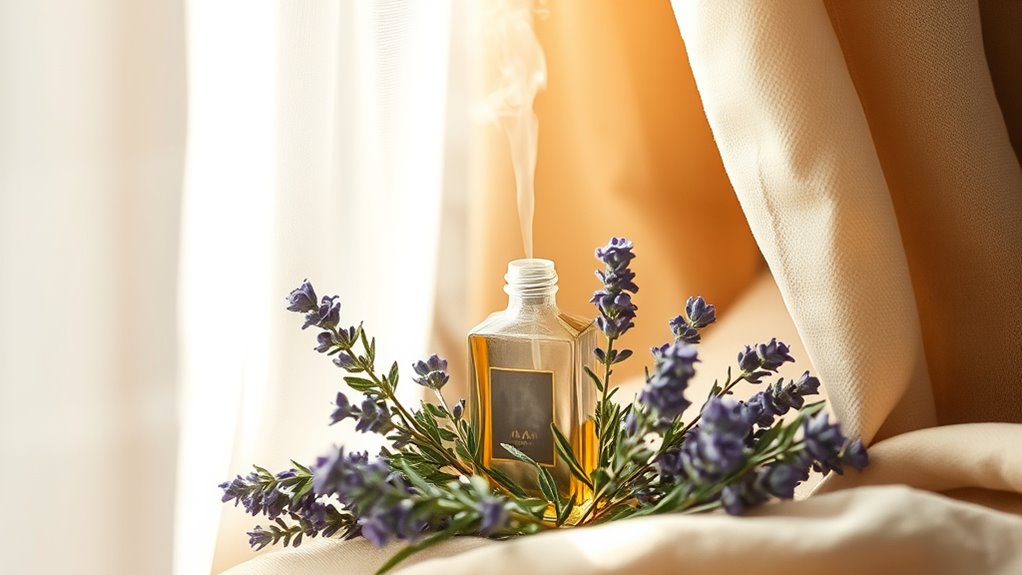
Fragrances have a powerful impact on your mood and behavior, often influencing how you feel and act without you even realizing it. Your fragrance memory links specific scents to past experiences or emotions, shaping your current reactions. For example, the smell of vanilla might evoke comfort, while citrus can energize you. Scent symbolism also plays a role, as certain fragrances are associated with particular feelings or cultural meanings—like lavender representing calmness or peppermint signaling alertness. These associations can influence your behavior subtly yet profoundly, affecting your confidence, stress levels, and social interactions. Additionally, understanding how essential oils interact with your subconscious can help you harness scent to enhance your mood and create a more positive environment.
The Role of Scent in Creating a Comfortable Home Environment
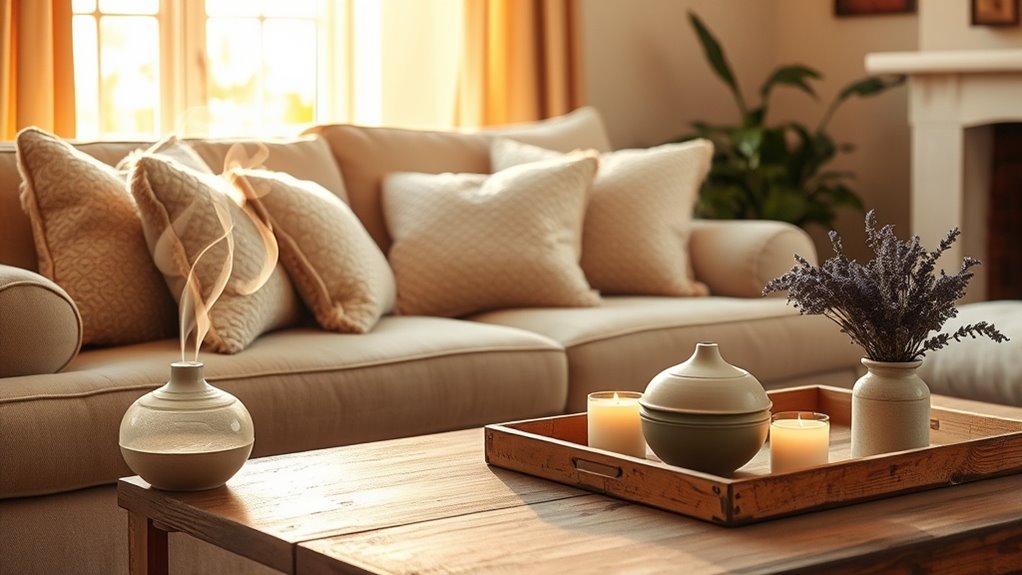
A welcoming home often begins with the right scents, as they can instantly set a cozy and inviting atmosphere. Scented wallpapers add a subtle aroma that enhances the room’s ambiance without overwhelming your senses. They’re an easy way to introduce comforting fragrances into any space. Aroma diffusers are another effective tool, dispersing essential oils evenly and creating a calming environment. Whether you prefer calming lavender, invigorating citrus, or warm vanilla, these scents help you feel more relaxed and at ease. Combining scented wallpapers with aroma diffusers allows you to customize your home’s aroma, making it more personal and soothing. When chosen thoughtfully, the right scent can turn your house into a sanctuary of comfort and tranquility. Creating Your Dream Backyard Greenhouse can also incorporate natural fragrances, further enriching your home’s sensory experience.
Cultural Differences in Scent Preferences and Comfort

Cultural backgrounds deeply influence how people perceive and prefer scents for comfort. Your cultural scent preferences shape what aromas feel familiar and soothing. For example, in some cultures, floral or citrus scents are comforting, while others favor spicy or woody fragrances. These differences extend to global aroma rituals, where scent plays a central role in daily life and traditions. In Japan, subtle incense enhances spiritual practices, whereas in the Middle East, rich perfumes are woven into social customs. Recognizing these cultural variations helps you understand that scent preferences are not universal but shaped by environment, tradition, and history. Additionally, the use of self-watering plant pots reflects a practical adaptation to different cultural approaches to plant care, emphasizing how environmental factors influence daily routines. Embracing this diversity allows you to appreciate how aroma choices connect deeply with cultural identity and comfort.
Using Aromatherapy to Enhance Well-Being
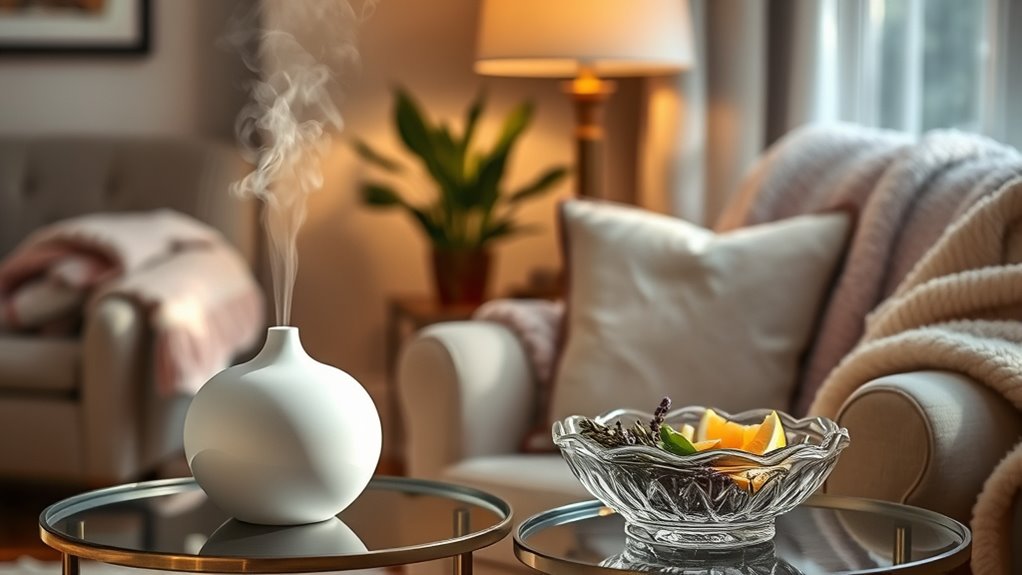
Because scents have the power to influence your mood and physical state, many people turn to aromatherapy as a natural way to boost well-being. The benefits of scent therapy include reducing stress, improving sleep, and enhancing focus. When you use essential oils like lavender or eucalyptus, you activate your senses to promote relaxation and mental clarity. Aromatherapy benefits extend beyond mood; they can also support immune health and alleviate physical discomfort. Incorporating scent therapy into your daily routine is simple—diffuse oils, add them to a bath, or apply diluted blends to your skin. Additionally, choosing water-resistant and hypoallergenic products ensures a safe and effective experience. By harnessing the power of natural fragrances, you create a calming environment that nurtures your overall sense of well-being.
The Impact of Unpleasant Odors on Stress Levels

Unpleasant odors can substantially elevate your stress levels, often without you realizing it. If you’re sensitive to certain smells, your odor sensitivity may cause heightened anxiety or discomfort in environments with strong or foul odors. These odors trigger a stress response, releasing hormones like cortisol that make you feel more tense and uneasy. Over time, persistent exposure can hinder stress reduction efforts, making it harder to relax or focus. Recognizing how unpleasant smells impact your mood is key to managing stress effectively. By minimizing exposure to bad odors or using freshening techniques, you can help lower your stress levels. Creating a scent environment that avoids overwhelming or irritating odors supports better stress management and enhances your overall comfort. Awareness of pinball machine weight can also influence your environment and stress levels, especially if you’re setting up a gaming space.
Personalizing Your Scent Environment for Better Comfort
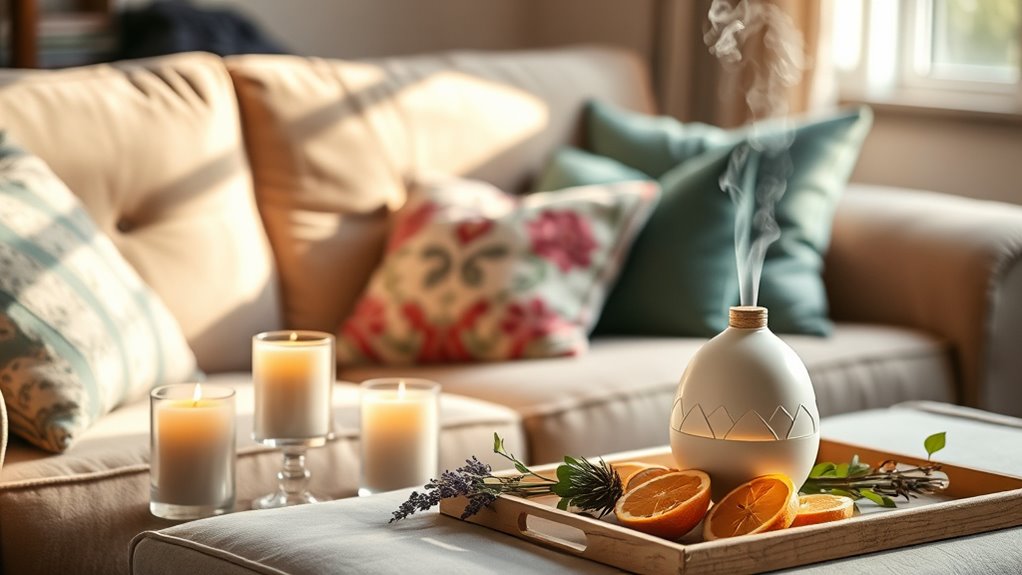
Personalizing your scent environment allows you to create a space that promotes comfort and relaxation. To do this effectively, consider these steps: 1. Identify your personal scent preferences—whether floral, citrus, or earthy—to guarantee your environment feels authentic. 2. Experiment with scent layering by combining complementary fragrances to deepen your sense of comfort. 3. Use diffusers, candles, or sprays strategically, placing them in areas where you spend the most time. 4. Adjust intensity by controlling the amount and frequency of scent application to avoid overpowering your space. Incorporating ambient sounds can also enhance the relaxing atmosphere and reinforce the sensory experience.
Practical Tips for Incorporating Pleasant Scents Into Daily Life
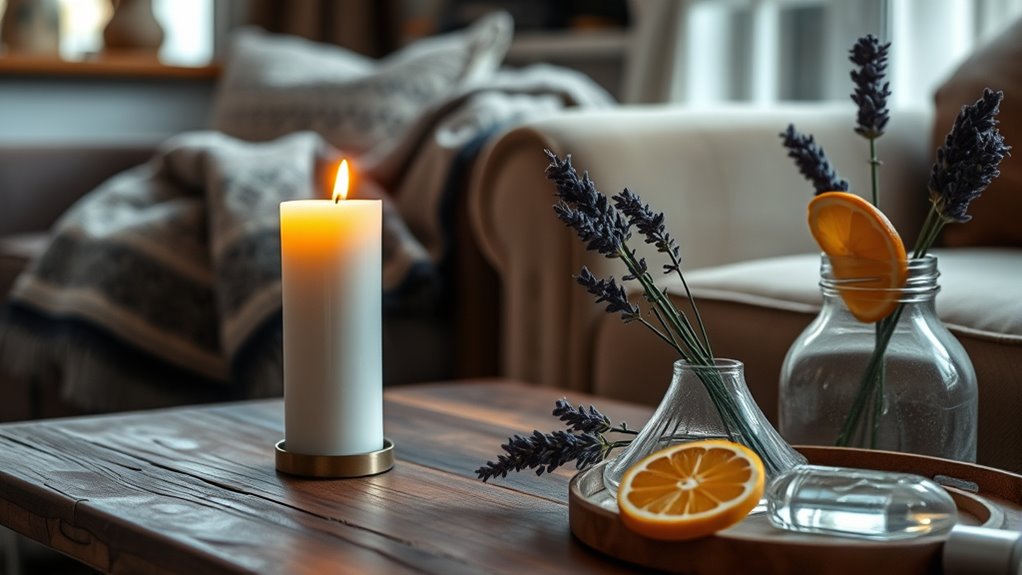
Incorporating pleasant scents into your daily routine is a simple way to enhance your mood and create a more inviting environment. Start with scent layering by combining complementary fragrances in your home, such as vanilla and citrus, to develop a personalized aroma. Experiment with DIY fragrance blends using natural ingredients like essential oils, which allow you to craft unique scents that suit your preferences. Use diffusers, scented candles, or even fresh herbs and flowers to spread these fragrances around your space. Remember to keep it subtle—overpowering scents can have the opposite effect. Regularly refresh your scents to maintain their impact and keep your environment feeling welcoming. With these practical tips, you can effortlessly integrate pleasant scents into your everyday life.
Frequently Asked Questions
Can Scent Preferences Change Over a Person’s Lifetime?
Your scent preferences can definitely change over your lifetime. Factors like scent nostalgia and olfactory aging influence how you perceive fragrances. As you grow older, your sense of smell may become more sensitive or less sharp, leading to shifts in what scents you enjoy. Memories tied to certain smells can also evoke nostalgia, making you favor or avoid specific fragrances. So, your preferences evolve naturally, shaped by experiences and biological changes.
How Do Scent Sensitivities Vary Among Individuals?
You’ll find that scent sensitivities vary greatly among individuals due to differences in olfactory adaptation and scent memory. Some people become quickly desensitized to certain smells, while others remain highly sensitive. Your past experiences with specific scents shape your reactions, making certain odors more or less tolerable. This variability means what’s comfortable for you may not be for someone else, highlighting the unique ways your nose perceives the world.
Are There Specific Scents That Universally Promote Comfort?
Many people find certain scents universally comforting, especially in sleep environments. You might notice that familiar childhood aroma memories—like vanilla, lavender, or chamomile—bring a sense of serenity and security. These soothing scents, often associated with calming routines, can promote relaxation, restful sleep, and overall comfort. While scent preferences are personal, gentle, natural fragrances tend to foster feelings of peace and tranquility for most individuals.
Can Scent Exposure Influence Long-Term Emotional Health?
Scent exposure can influence your long-term emotional health through olfactory memory and scent conditioning. When you repeatedly associate certain scents with positive experiences, your brain links those smells to comfort, potentially boosting your mood over time. Conversely, negative associations may lead to lasting stress or anxiety. By consciously using scent conditioning, you can shape your emotional responses, promoting resilience and overall well-being in the long run.
How Do Scent Marketing Strategies Affect Consumer Comfort?
Imagine walking into a cozy café where a warm cinnamon aroma instantly relaxes you—that’s scent marketing working. It influences your comfort by triggering positive memories and aiding mood regulation. When brands use inviting scents, they create a welcoming atmosphere, making you feel at ease and more likely to stay. This strategy taps into memory triggers, shaping your overall experience and boosting your comfort in the space.
Conclusion
By thoughtfully choosing your scents, you create a cozy haven where comfort naturally blossoms. When you embrace fragrances that soothe your senses, you’ll find your space feels more inviting and your mood lifts effortlessly. It’s like giving your environment a gentle hug, encouraging relaxation and happiness without much effort. So, trust your nose and sprinkle a little aroma magic—you deserve a space that feels just right, every single day.
